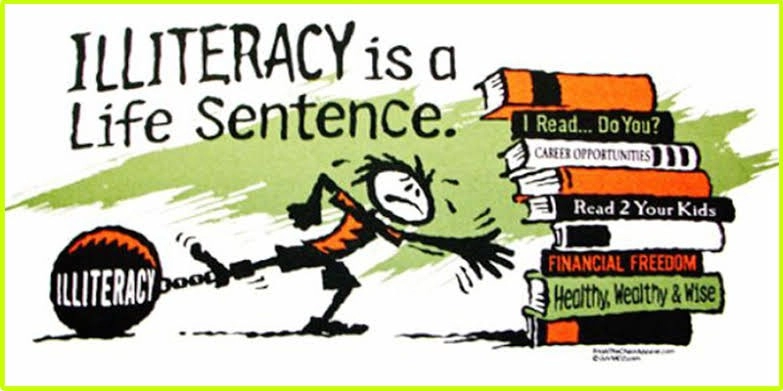ILLITERACY: THE ULTIMATE PROBLEM
By School Admin
If we, somehow, compel ourselves out from our busy lives to ponder upon the mishaps around us-to delicately observe all the phenomena of our society-we may proudly come to a conclusion, undoubtedly preceded by a rigorous mental exercise. After having insightfully scrutinized, some learned people may say that the problem of illiteracy is the major cause of all social ills and crimes. Interestingly enough, illiteracy is both a cause as well as a consequence of social ills.
Let’s take a typical poor family in a slum that bore a child who has now grown up to an adult. The grown-up is but unemployed and would be sitting at home idle or playing cards at the corner of the slum area most of the time. The poor circumstances at home will urge the person to make some money, but the illiterate chap will surely take an ‘easy way’. In this very manner, poor conditions will lead to the establishment of criminals. However, indulging in offenses to make money will not make him a billionaire. Not even he will be better off than before. Instead, the person will add the number of crimes in the slum or the county. Even after that, when he will have a family and children, they will also have to live in harsh and poor conditions. His uneducated children, getting inspired by their father, might again tend to take the effortless way of making money. In this fashion, the seeds of illiteracy would grow into a tree of social ills and even the fruits of this tree being illiteracy. This ecosystem of trees and fruits will go on for ages unless it is slashed from the roots.
If we come up again with a glimmer of an insightful perception to that person’s case, we can easily perceive that the unlawful acts being done in our society such as crimes, corruption, and many other sins are a result of illiteracy. Now, if we suppose that the chap were not illiterate, then he could have easily allowed himself to get employed to a better work. In this way, maybe he and his family would have gotten out of the slum area. Even this would have made the way easy for his child to get educated and lead a better future. Clearly, education could have changed the life of that person and even the upcoming generations. Education will not only compose scholarly people but will also reduce social ills and offenses. Education will hit two sparrows by one arrow. This, thereby, gives a call for conferring education to all.
Now, if it is well known that education is such an important element in one’s life, then there should be no further delay in establishing educational institutions and filling them with educators. But still, there are many problems. Economical problems, as we have seen in the above case, lead parents to force their child to some wealth-procuring activities. According to the International Journal of Engineering and Technical Research (IJETR) Volume-9, Issue-4, April 2019; 36.4 % of people say that poverty is the major cause of illiteracy. In addition to this, 53.9 % consider poverty as a hindrance to education.(https://www.erpublication.org/published_paper/IJETR2739.pdf)
So, it will not be feasible to set up institutions and rely to children to come themselves. Nonetheless, as we have seen that poverty and illiteracy are closely connected, therefore eradicating anyone of them will mitigate the other as well. This calls for the government to fix the problem of poverty and provide education as well.
Even ahead, if a family is able to erode all the problems of resources, stereotypes and discrimination, and it is willing to send their children to institutions of schooling, there lies one more mystery: Is the education system of our country capable of giving proper knowledge to students? An answer to this can be easily concluded by a very important report given by the same journal as above. According to it: “56% of survey responders rated our country’s education system as average, with 29% rating it below average and only 15% rating it above average.”
So, after the thorough examination of the above account, irrefutably, we may say that though the problems are known, the solutions can be conferred hand-in-hand. Rewardingly, at least the rehabilitation of these minute problems will eventually lead to the eradication of the ‘ultimate problem’.
https://images.app.goo.gl/YGLeDmaaJMexZEX98
AYUSH TIWARI
CLASS-X
